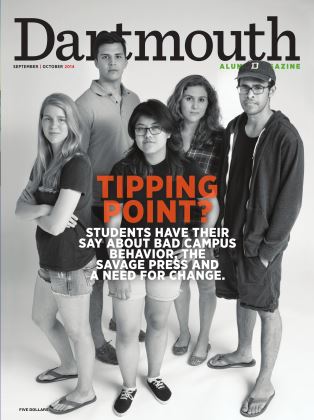"It was very unusual to have so many top-level people from the grassroots, the government, the military and the academy," says Jean Kilbourne, a longtime lecturer, author and filmmaker who was among the presenters at July's Dartmouth Summit on Sexual Assault. "I was also impressed that President Phil Hanlon '77 was not only there but opened the summit, because the only way change will happen is with the involvement of top administrators."
Presenter Jackson Katz, a cultural theorist, told roughly 300 attendees from more than 60 colleges and universities that educators need to act. "It's important to have mandatory conver- sations about sexual assault," he said. "A college president needs to force all male students to go through bystander training." Ath- letic directors also need to follow up, he said, but there has been "a lack of political will" demonstrated by college administrators. Katz concluded by saying that tackling assault is "not just a mat- ter of public safety but an intellectual imperative."
Forensic consultant David Lisak, who conceived the sum- mit, says, "Every institution has issues that have to be addressed. Across higher education we have not done an adequate job of that and living up to our name, but we are now taking this on."
Cynics have suggested that Dartmouth hosted the gathering because it is one of 67 institutions being investigated by the U.S. Department of Education's Office of Civil Rights.
"Perhaps Dartmouth did determine it would look good to show leadership on this issue," says Lisak. "More important is that the College is showing leadership and has gone way beyond hosting to provide resources and key staffing on an ongoing basis." (The College could not put a price tag on its underwrit- ing of the event.)
Working groups that met for two days in Hanover will con- tinue to meet to develop recommended campus practices.
 View Full Issue
View Full Issue
More From This Issue
-
 FEATURE
FEATUREThe Rookie
September | October 2014 By Matthew Mosk ’92 -
 COVER STORY
COVER STORYWhat’s Going On Here?
September | October 2014 By Jennifer Wulff ’96 -
 Feature
FeatureCan Students Police Themselves?
September | October 2014 By EVA XIAO ’14 -
 Feature
FeatureOff the Beaten Path
September | October 2014 By RIANNA P. STARHEIM ’14 -
 Feature
FeatureNotebook
September | October 2014 By JOHN SHERMAN -
 Feature
FeatureClass Notes
September | October 2014 By DARTMOUTH COLLEGE LIBRARY
Article
-
 Article
ArticleThayer School
June 1939 -
 Article
ArticleCornell Downed, 27-14
December 1956 -
 Article
ArticleMasthead
DECEMBER 1963 -
 Article
ArticleFrom a Press Room
August, 1926 By Alexander K. Laing '25 -
 Article
ArticleMINUTES OF THE MEETING OF THE ALUMNI COUNCIL
July 1920 By HOMER E. KEYES -
 Article
ArticleFree Speech at Issue
NOVEMBER 1969 By ROBERT B. GRAHAM

